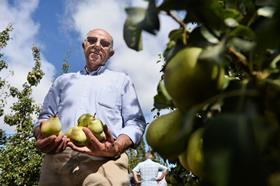
This year’s Rocha pear harvest is projected to fall by around 50 per cent. How will this affect your push into new markets?
Aristides Sécio: It will come down to managing stocks in a much more rigorous way. There’s no doubt that the smaller crop limits our export options, but we will concentrate on increasing quality and price and focus our efforts on supplying both new customers and those in our most demanding markets who already appreciate the quality of our pears.
To what extent is the structure of Portugal’s production base hampering export growth?
AS: Rocha pear production is still highly fragmented and we definitely see a need for more unity among co-operatives. There have been some attempts to group co-operatives together into unions but it would help to have a more comprehensive approach in place across the industry. Ideally, I would like to see one entity overseeing the marketing and sales of Rocha pears and setting a single price for exports.
You launched your new season marketing campaign in September. Can you tell us what it consists of?
AS: The aim of the campaign is to promote Rocha as the only pear that can be consumed in a variety of ways and at different stages of its maturation, be it fresh, or used as an ingredient in desserts. The slogan of the campaign is “Rocha Pear: the flavour of Portugal” and it will run across various consumer media.
What is the industry’s strategy to increase production?
AS: There is no formal plan in place but in recent years we have seen producers renewing old orchards and planting new areas due to strong market demand. As a result we expect volumes to grow significantly in the coming years.
Will your focus now be more on retailers, distributors or foodservice?
AS:All of these market sectors are attractive, although each of them also presents its own challenges. Retail is obviously very interesting because of the large volumes involved, although this has to be backed up by the proper logistics required to deliver to numerous stores. The other channels are also important and their reduced scale will be better-suited to some of our members.
Are there any government initiatives designed to help producers of Rocha pears expand their export markets?
AS: The government’s Compete 2020 programme, now in its second year, is a joint initiative with the European Commission designed to stimulate growth and job creation by bringing together structural funds that provide for economic development policies up to 2020. One of the main aims of the programme is to stimulate the production and exports of goods and services, and it is an important tool for small and medium-sized Rocha pear growers, as it provides support for international marketing initiatives that encourage them to gain knowledge of and access to new markets. I think that by making good use of this support, growers will be able to conquer new markets and the Rocha pear brand will become stronger and more competitive.
What, in your opinion, are the main obstacles to export growth?
AS: Portugal’s location in the southwestern corner of Europe brings with it increased transportation costs when it comes to sending products to central and eastern European markets. Another barrier to growth is the complexity involved in securing access to new markets, which makes it such a lengthy and bureaucratic process. Nevertheless, as growers, we are used to reaping the results of our hard work and as such we believe that over time more and more consumers will discover our Rocha pears and become fans of the unique characteristics that make it one of nature’s tastiest fruits.



